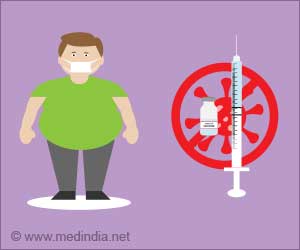- Women, especially overweight women, are more prone to long-standing symptoms caused by COVID-19.
- Women are more likely to be overweight or obese due to hormones and other factors
Prof. Vassilios Vassiliou, from UEA’s Norwich Medical School, said: "Long COVID-19 is a complex condition that develops during or after having COVID, and it is classified as such when symptoms continue for more than 12 weeks. Just over two million people in the UK are thought to suffer from long-standing symptoms of COVID, and it affects people in different ways. Breathlessness, cough, heart palpitations, headaches, and severe fatigue are among the most prevalent symptoms. Other symptoms may include chest pain or tightness, brain fog, insomnia, dizziness, joint pain, depression and anxiety, tinnitus, loss of appetite, headaches, and changes to the sense of smell or taste."
In 2020, the study team assessed patients in Norfolk who had a positive COVID-19 PCR test result. An online survey was completed by 1,487 participants who reported long-term symptoms such as shortness of breath, chest pain, exhaustion, memory issues, and worry. They discovered that more than half of the subjects (774 of them) had at least one prolonged COVID-19 symptom, indicating a significant self-reported prevalence.
They next examined the individuals' medical records to identify what characteristics would make people more or less likely to suffer from the illness. BMI, gender, medication use, other health issues, and whether they resided in an impoverished area were all considered.
Prof. Vassiliou said: "We show that more than half of the survey respondents who tested positive for COVID in the East of England during the first year of the pandemic went on to report long-term COVID symptoms. All of these people were infected in the months before the COVID vaccination program was rolled out, and they suffered from numerous new symptoms that were not present before their COVID infection." "We discovered that women had longer COVID symptoms than men. It was also found that having a higher BMI was related to having a long COVID. This is really important because information like this can be used to profile those people who are ‘at risk’ of developing long COVID, and people with long COVID were over three times more likely to use healthcare services than those who didn’t display long COVID symptoms."
"We hope that our work will help policymakers plan local services and also inform the wider public of the scale of the long COVID pandemic," he added. Dr. Mark Lim, interim service director of the Norfolk and Waveney Integrated Care Board, said: "When COVID-19 struck, it was new to everyone. All clinicians and the wider health and care system worked extremely hard together to deal with the impacts of the virus and protect our people and communities."
"Our academic colleagues at the University of East Anglia have greatly assisted local health care organizations in identifying local patients at risk of long COVID, allowing us to do everything possible to support them on their recovery journey."
Long Standing Covid Symptoms
People suffering from post-COVID issues (or long COVID) may have a variety of symptoms that can linger for several weeks or even months following the infection. Symptoms may even disappear or make a reappearance at times.The WHO data also backs up other research findings that women are more likely than men to suffer from long COVID syndrome. According to the model, females are twice as likely as males to have lengthy COVID. Apart from gender, older age and active smoking were found to be connected with a higher likelihood of developing "long COVID" syndrome, but not the severity of the acute disease (1✔ ✔Trusted Source
Female gender is associated with long COVID syndrome: a prospective cohort study
Go to source).
Obesity Prevalence Among Women
There is a global obesity pandemic. The prevalence of overweight and obesity among men and women varies widely within and between countries, with women being on average more obese than males.Women in underdeveloped nations, notably in Africa, have greater gender discrepancies in overweight and obesity. According to current research, many societal elements around the world accentuate gender differences in excessive weight gain. Gender disparities in food consumption are influenced by a variety of contextual circumstances, and women frequently report eating healthier foods while also eating more sugary foods than men (2✔ ✔Trusted Source
Global gender disparities in obesity: a review
Go to source).
Why do Women and Men Store Fat Differently?
Women's apparent capacity to store fat more efficiently than men, despite ingesting proportionally fewer calories, has perplexed scientists for years. While female sex hormones have long been hypothesized, research shows that the hormone 'oestrogen' has a major impact on fat storage (3✔ ✔Trusted SourceSex differences in the regulation of body weight
Go to source).
Obesity is often blamed on bad food habits and inactivity, but it's not always that straightforward. Other factors, some of which are beyond a person's control, can have a significant impact on body weight and obesity.
Multiple variables, many of which are beyond your control, contribute to obesity, including genetics, childhood practices, medical issues, hormones, powerful hunger hormones, leptin resistance, poor nutrition knowledge, and the effect of gut bacteria (4✔ ✔Trusted Source
The obesity epidemic: challenges, health initiatives, and implications for gastroenterologists
Go to source).
Though becoming overweight or obese is not a decision and losing extra weight is difficult, you can lose weight if you want to, which can help you manage the symptoms of viral infections like COVID-19 much better and avoid the long-standing symptoms of COVID-19 infection.
References :
- Female gender is associated with long COVID syndrome: a prospective cohort study - (https://www.ncbi.nlm.nih.gov/pmc/articles/PMC8575536/)
- Global gender disparities in obesity: a review - (https://pubmed.ncbi.nlm.nih.gov/22797984/)
- Sex differences in the regulation of body weight - (https://pubmed.ncbi.nlm.nih.gov/19250944/)
- The obesity epidemic: challenges, health initiatives, and implications for gastroenterologists - (https://pubmed.ncbi.nlm.nih.gov/21301632/)
Source-Medindia
















